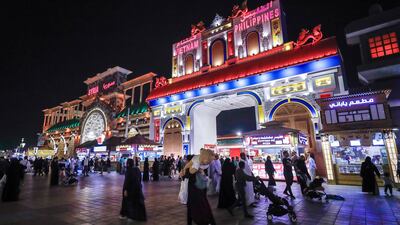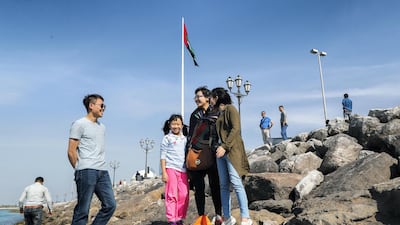One of my favourite sentences in the English language is the opening of Charles Dickens' A Tale of Two Cities.
"It was the best of times, it was the worst of times, it was the age of wisdom, it was the age of foolishness, it was the epoch of belief, it was the epoch of incredulity, it was the season of light, it was the season of darkness, it was the spring of hope, it was the winter of despair."
Dickens was referring to London and Paris. Since Dickensian times, however, several cities in the Gulf have also risen to global prominence. The two whose tales I have had the pleasure to watch unfold, are Dubai and Abu Dhabi.
According to Mastercard's 2019 Global Destination Cities Index, Dubai has been the world’s fourth most visited city for the fifth consecutive year. Paris and London retain the second and third spots respectively, with Bangkok being the most visited.
This data also ranks Abu Dhabi as the fastest-growing international destination from a list of 200 cities. More recently, based on the rate of tourist-style pictures posted on social media, the travel website, Big 7, named Dubai the third-most "Instagramable" place on the planet in 2020 – ahead of London and Paris.
If you look at the data, the growing popularity of Dubai and Abu Dhabi for tourists is clear. Google Trends, a free service, allows us to see how frequently a search has been run during a specific period. It shows that searches for Dubai rose sharply year-on-year since 2004 – when the service’s records began.
A similar pattern is evident for Abu Dhabi, with one significant difference. Searches for Dubai peak in January each year, while more people search for Abu Dhabi in November.
It is likely that these consistent spikes relate to January's Dubai Shopping Festival and November's Abu Dhabi Grand Prix, two major UAE tourist attractions.
The UAE's global fame has also found its way into popular culture. Songwriters and recording artists are waxing lyrical about cities in the Gulf. The idea of name-dropping places is not new though.
From Frank Sinatra and Sting to Jay-Z and Alicia Keys, several artistes have sung New York’s praises.
Now artists are singing about Dubai and Abu Dhabi. The most recent example is UK rapper Stormzy referencing “chillin’ in Dubai” in a track titled Vossi Bop. Other artists who’ve sung about the UAE include Grammy winners such as Common and the first billionaire rapper, Jay-Z.
I discovered odes to the Emirates in English, German, Portuguese and French. One Brazilian rap group, Hungria Hip Hop, even have an album track titled Dubai. Not to be outdone, American rapper Krizz Kaliko has a song called Abu Dhabi, as does the award-winning French artist, Jain.
Inspired by her time in the emirate, Jain sings: “And the sun is so bright / All I need is to hide / In the shadows of your walls/ I wanted to see it all”.
Having your praises sung tends to result in more fame, which is what has happened in the case of the UAE. The popularity and reputation of the cities have boosted tourism.
The idea of people travelling for recreation can be credited to Thomas Cook, the 19th-century founder of an eponymous, though now bankrupt, travel agency. Nearly 180 years later, the tourism industry has grown exponentially.
The number of adults taking foreign holidays went from 9 million in 1950 to 32 million at the beginning of this century. With rapidly expanding middle classes in China and India, the United Nations World Tourism Organisation predicts that global tourism will reach 2 billion trips a year by 2030.
One of the obvious upsides of tourism is the revenue it generates. Statistics from 2017 put tourism’s contribution to the global economy at $8.6 trillion per year, suggesting that it accounts for one in every 10 jobs. The challenge is maximising the benefits of mass tourism while minimising the harm it can cause.
When beautiful, deserted beaches become crowded, they are no longer beautiful. It is evident all over the world that tourism can place enormous stress on the environment, gradually depleting resources on which the industry depends.
The International Ecotourism Society defines ecotourism as "responsible travel to natural areas that conserves the environment and improves the well-being of local people."
I hope in the next chapter in the history of tourism, and in our own tale of two emirates, there is as great an emphasis on the environment as there is on tourism.
Justin Thomas is a psychology professor at Zayed University








